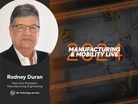Manufacturing & Mobility LIVE: L&T Technology Services

At Manufacturing & Mobility LIVE, Rodney Duran, Area Vice President and Manufacturing Practice Head at L&T Technology Services, presented a comprehensive overview of sustainable manufacturing.
Rodney shared insights into its challenges, benefits, and the critical strategies needed to integrate sustainability into manufacturing processes effectively.
To watch Rodney's keynote, click here.
Understanding the need for sustainable manufacturing
Rodney opens with a stark statistic: manufacturing accounts for 54% of global energy consumption and 20% of greenhouse gas emissions.
Highlighting data from the World Economic Forum and Gartner, he emphasises that 87% of companies are now investing in sustainable practices, though only 24% have the capabilities to implement these effectively.
For Rodney, sustainability in manufacturing is not just an obligation but a necessity for the future. It encompasses design, sourcing and production practices aimed at minimising environmental impact while maintaining product quality.
Benefits and priorities in sustainable manufacturing
Rodney outlines the tangible and intangible benefits of adopting sustainable manufacturing practices.
These include:
- Tangible benefits: Improved efficiency and reduced costs for packaging, transportation and production.
- Intangible benefits: Increased employee engagement and fostering a sense of purpose across teams.
He also highlights how high ESG ratings can attract investors and contribute to a company’s reputation.
From an operational standpoint, Rodney underscores the importance of prioritising product development and engineering as key drivers of sustainability.
Incorporating eco-friendly design requirements, such as using biodegradable materials and minimising waste, is essential during the product development phase.
Key strategies for integrating sustainability
Rodney shares actionable strategies to enhance sustainability across various aspects of manufacturing:
Product Development
- Emphasise lightweight, structurally sound designs that reduce material usage.
- Ensure products are multi-purpose or reusable to extend their lifecycle
Sourcing
- Prioritise suppliers with high ESG ratings.
- Opt for local sourcing to minimise transportation-related emissions.
Manufacturing
- Invest in high-efficiency equipment and retrofit legacy machines with sensors to monitor and optimise energy usage.
- Use real-time monitoring systems, such as manufacturing execution systems, to identify and address waste quickly.
Warehousing and logistics
- Optimise warehouse density and employ autonomous moving robots to streamline operations.
- Enhance supply chain efficiency to support onshoring and localisation efforts.
Recycling
- Plan for end-of-life disposal by designing products with recyclable materials.
- Transition product manuals and instructions to digital formats to reduce paper waste.
Technology’s role in sustainability
Rodney highlights how AI and digital tools like digital twins are transforming manufacturing processes. These technologies enable simulations that uncover inefficiencies and suggest optimised processes.
By adopting these solutions, manufacturers can improve product performance and streamline operations.
He also stresses the potential of additive manufacturing in reducing material waste during prototyping and production. While its role in mass production is still evolving, its ability to create complex, resource-efficient designs is already proving valuable.
Building a sustainable framework
Rodney emphasises that successful implementation of sustainable manufacturing requires:
- Vision: Establish a clear and compelling sustainability vision.
- Engagement: Ensure buy-in at all organisational levels to embed sustainability into the company culture.
- Roadmap: Develop an adaptive roadmap with defined goals and metrics to track progress.
- Governance: Implement robust governance to measure and manage emissions, water usage, and waste.
He cautions against treating sustainability as a ‘pet project’, advocating for its integration into a company’s broader strategy.
Rodney concludes by stressing the importance of purpose in sustainability. For organisations struggling to execute their goals, he encourages leveraging external expertise and technologies. As Rodney aptly summarises, sustainability is about creating long-term value for both the organisation and the planet.
To watch Rodney's keynote, click here.
Essential diary dates for 2025
Discover the essential diary dates for Manufacturing Digital, as well as sister publications Procurement Magazine, Supply Chain Digital and Sustainability Magazine.
To follow Manufacturing LIVE on LinkedIn, click here.
To enter for the Global Procurement & Supply Chain Awards, click here.
- Procurement & Supply Chain LIVE Singapore | 11 February
- Procurement & Supply Chain LIVE: Sustainability | 5-6 March
- Sustainability LIVE: Net Zero | 5-6 March
- Procurement & Supply Chain LIVE Dubai | 29 April
- Sustainability LIVE Chicago | 28-29 May
- Procurement LIVE Chicago | 28-29 May
- Supply Chain LIVE Chicago | 28-29 May
- Manufacturing & LIVE Chicago | 28-29 May
- Procurement & Supply Chain LIVE London | 23-24 September
- Procurement & Supply Chain Awards | 24 September
Explore the latest edition of Manufacturing Digital and be part of the conversation at our global conference series, Manufacturing LIVE.
Discover all our upcoming events and secure your tickets today.
Manufacturing Digital is a BizClik brand.
- Manufacturing & Mobility LIVE: Amir Vaziri, PhysicsX keynoteTechnology
- Manufacturing & Mobility LIVE: Sustainable ManufacturingSustainability & ESG
- Manufacturing & Mobility LIVE: The Future of EVs & MobilitySustainability & ESG
- Manufacturing & Mobility LIVE: Snowflake’s Greg SloyerTechnology

